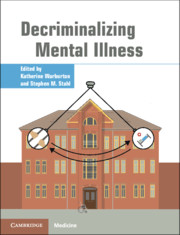Book contents
- Decriminalizing Mental Illness
- Decriminalizing Mental Illness
- Copyright page
- Contents
- Contributors
- Part I Introduction/Description of the Problem
- Part II Solutions
- Part III Psychopharmacological Treatment Considerations
- Part IV Nonpsychopharmacological Treatment Considerations
- Chapter 21 Neurocognition and Social Cognition Training as Treatments for Violence and Aggression in People with Severe Mental Illness
- Chapter 22 Examining Violence Among Not Guilty by Reason of Insanity State Hospital Inpatients Across Multiple Time Points: The Roles of Criminogenic Risk Factors and Psychiatric Symptoms
- Chapter 23 Criminogenic Risk and Mental Health: A Complicated Relationship
- Chapter 24 Implementation of a Specialized Treatment Program to Reduce Violence in a Forensic Population
- Chapter 25 From Trauma-Blind to Trauma-Informed: Rethinking Criminalization and the Role of Trauma in Persons with Serious Mental Illness
- Chapter 26 The Indistinguishables: Determining Appropriate Environments for Justice-Involved Individuals
- Chapter 27 Breaking Down Long-Term Chronic Aggression Within a Forensic Hospital System
- Part V Criminal Justice and Social Considerations
- Index
- References
Chapter 21 - Neurocognition and Social Cognition Training as Treatments for Violence and Aggression in People with Severe Mental Illness
from Part IV - Nonpsychopharmacological Treatment Considerations
Published online by Cambridge University Press: 19 October 2021
- Decriminalizing Mental Illness
- Decriminalizing Mental Illness
- Copyright page
- Contents
- Contributors
- Part I Introduction/Description of the Problem
- Part II Solutions
- Part III Psychopharmacological Treatment Considerations
- Part IV Nonpsychopharmacological Treatment Considerations
- Chapter 21 Neurocognition and Social Cognition Training as Treatments for Violence and Aggression in People with Severe Mental Illness
- Chapter 22 Examining Violence Among Not Guilty by Reason of Insanity State Hospital Inpatients Across Multiple Time Points: The Roles of Criminogenic Risk Factors and Psychiatric Symptoms
- Chapter 23 Criminogenic Risk and Mental Health: A Complicated Relationship
- Chapter 24 Implementation of a Specialized Treatment Program to Reduce Violence in a Forensic Population
- Chapter 25 From Trauma-Blind to Trauma-Informed: Rethinking Criminalization and the Role of Trauma in Persons with Serious Mental Illness
- Chapter 26 The Indistinguishables: Determining Appropriate Environments for Justice-Involved Individuals
- Chapter 27 Breaking Down Long-Term Chronic Aggression Within a Forensic Hospital System
- Part V Criminal Justice and Social Considerations
- Index
- References
Summary
There is a wide-ranging belief that people with severe mental illnesses (SMI) are violent or dangerous. Most patients with schizophrenia are not chronically aggressive or violent; among patients with schizophrenia, there is a small increase in violence and violent offending on average compared with general population standards in the USA and Europe. However, violence on the part of people with SMI has several features that differentiate it from violence in the general population. First, it is less likely to be motivated by financial reasons. Second, it can be unpredictable and directed toward strangers. Not being financially motivated, it is more challenging for the general public to avoid.
- Type
- Chapter
- Information
- Decriminalizing Mental Illness , pp. 221 - 230Publisher: Cambridge University PressPrint publication year: 2021

